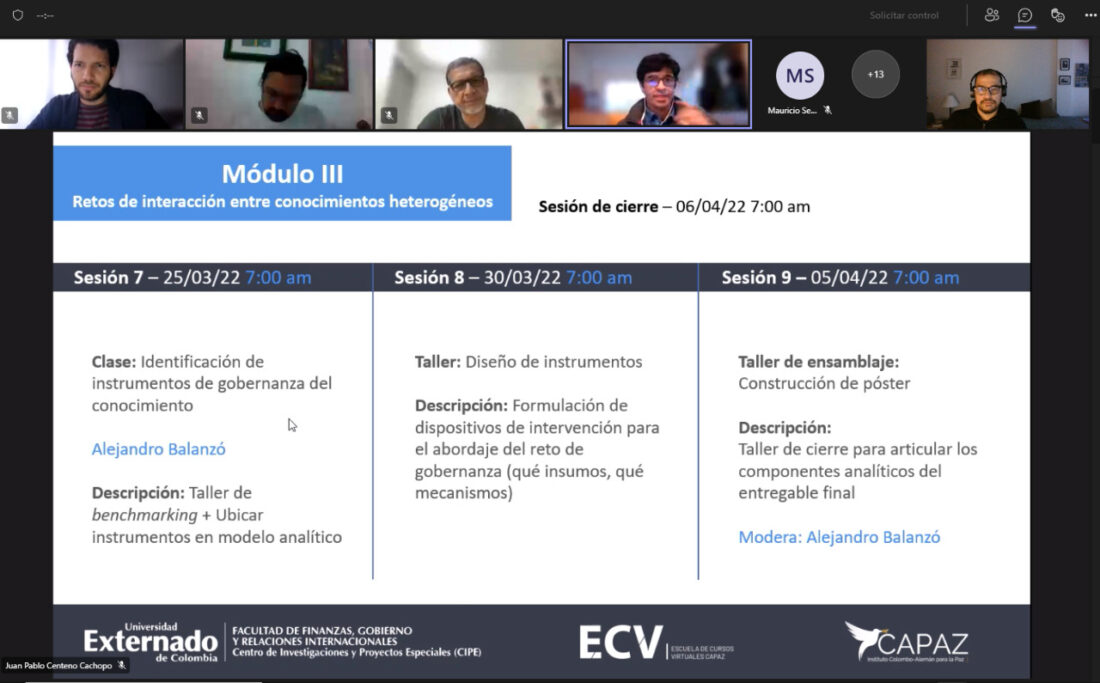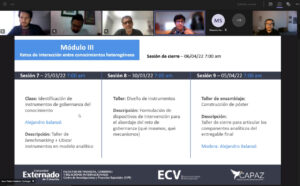
The online course “Management and Governance of Knowledge for Peacebuilding” run by CAPAZ and Universidad Externado de Colombia kicks off

Thursday, February 24 marked the beginning of the second part of the online course on “Knowledge Management and Governance for Peacebuilding”, organised by the School of Finance, Government, and International Relations (FIGRI) at Universidad Externado de Colombia, in partnership with CAPAZ, as part of its School of Online Courses. The course provides an opportunity for reflection on the interaction between different forms of knowledge in the context of peacebuilding, and identifies mechanisms that explain it along with tools that enhance it.
The course is intended to provide students with conceptual, analytical, and methodological tools to understand phenomena such as the co-creation and use of knowledge in peacebuilding initiatives involving multiple actors. It also offers the opportunity to develop potential collaborations around sectorial issues and knowledge management initiatives for territorial peacebuilding.
Accordingly, the course contents and discussions revolve around three main topics: 1) the role of knowledge in peacebuilding: knowledge about and/or for peace; 2) the public and knowledge policies that enhance or inhibit peacebuilding initiatives; and 3) the interaction between scientific knowledge and other forms of knowledge.

This year’ s course will involve different actors from governmental organisations, academic institutions, civil society organisations, and multilateral agencies, among others, in different parts of Colombia (Atlántico, Bogotá, D.C., Bolívar, Cundinamarca, Nariño, Valle del Cauca) and countries around the world (United Arab Emirates, Mexico, Spain, Venezuela, Brazil, United States). The participants include decision makers; public policy makers;¡, international cooperants; researchers and research managers/coordinators; undergraduate and graduate students involved in science, technology and society studies (STS); and managers of peacebuilding projects interested in understanding how knowledge empowers agents of local change, and how STI helps to achieve sustainable and lasting peace.
The course is part of a broader research and development agenda, led by Alejandro Balanzó, PhD, and Juan Pablo Centeno from Universidad Externado, and Carlos Nupia, PhD, from CAPAZ. The highlights of this collaborative work include 1) the organisation of the workshop called “Towards a Research Agenda on Scientific Knowledge, Society, and Peacebuilding in Colombia” in December 2018; 2) the organisation of the ‘Science, Peace, and Social Inclusion’ line in the “International Congress on the Governance of Science and Innovation. Towards inclusive development” in July and August 2019; 3) The policy brief “Knowledge, scientific research, and peacebuilding” in November 2019; 4) the publication of the special dossier of OPERA magazine No. 27 “Knowledge policies and governance in the transition to peace: science, diversity of knowledge and practices” in June 2020; and 5) a first part of the same course held from February to April 2021.




